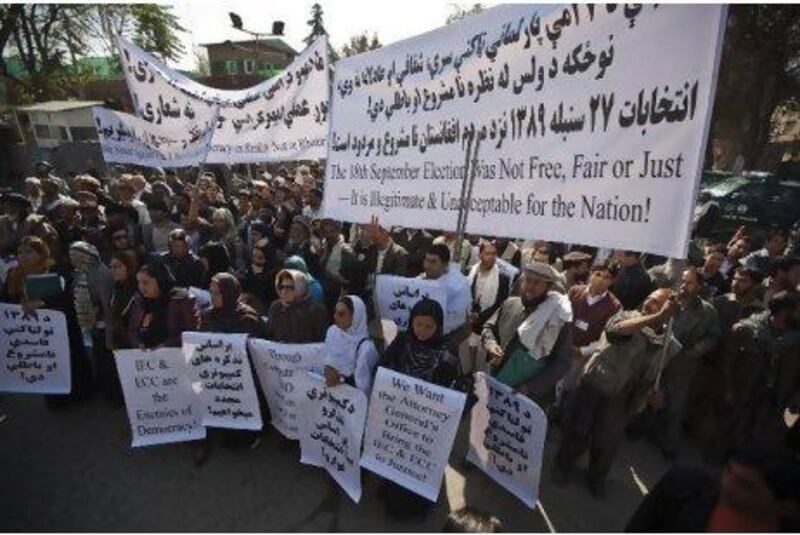KABUL // Two months after Afghanistan's parliamentary election, allegations of widespread fraud continue to delay the results amid warnings by candidates that the country's fragile democracy now hangs in the balance.
The September 18 poll has been plagued by claims ranging from vote-buying and ballot stuffing to accusations that senior government officials directly interfered in selecting the winners.
Although preliminary results have been announced, the United Nations-backed electoral watchdog has said these are now likely to change after verifying almost 2,500 complaints it deemed to be of high priority.
However, the fallout from the ballot is already being felt. Anger at the government and the international community has grown in recent weeks, with protests staged in parts of the country over the alleged fraud.
Further demonstrations are anticipated, but there are fears that the long-term impact could be even greater as more disenfranchised Afghans join the ranks of the Taliban.
Khalid Pashtoon, an incumbent politician who again ran for office in the southern province of Kandahar, said the electoral authorities had very few choices left.
"Now they have only two options. Option number one is to cancel the election completely and set a new date for that. Or they can just announce the result, whatever it is, which I am pretty sure they will do," he said.
"People will completely lose their confidence. People will no longer respect this government and, even, they will no longer respect the international community."
More than 2,400 candidates contested the election, hoping to win one of the 249 seats available in the lower house of parliament. Staffan de Mistura, the UN's special representative for Afghanistan, said beforehand that although the poll would be flawed, it would be "much better than previous ones".
The Taliban had vowed to disrupt the process and a number of insurgent attacks did take place. There was, though, no high-profile incident and the US Embassy in Kabul praised the "millions of courageous men and women" who voted.
Two months later, final results are expected to be announced, possibly in the next few days. This week the Electoral Complaints Commission said it had finished checking 2,495 key cases.
Mr Pashtoon is currently ninth in the standings for Kandahar, meaning he is set to narrowly miss out on retaining his seat.
He claimed the fraud was "wide ranging" and most of it was committed by the country's main electoral body, the Independent Election Commission. The fraud, he said, included staff members adding or taking away votes from their preferred candidates.
Mr Pashtoon believes the impact of the fraud allegations would not immediately lead to an upsurge in violence. Instead, he said, there will be a gradual erosion of security and further long-term instability.
"The international community told us 'we are against the warlords', we are against the drug lords, we are against this lord and that lord, but all of them have come in [to parliament]," he said.
The Independent Election Commission insisted measures had been implemented to combat the corruption, including cancelling 1.3 million votes. In a recent statement, it acknowledged that members of its own staff had occasionally teamed up with "certain individuals", including local commanders, security officials and government employees to "pervert the process".
Despite this, there is little confidence in some quarters that the final results will take into account the full scale of the fraud.
In a recorded phone conversation recently broadcast on Afghan television, the former mujahideen leader and acting government minister Ismail Khan appeared to tell an election official who should be named as winners in the western province of Herat.
Meanwhile, in a report earlier this month, an organisation established by civil society groups keen to encourage democracy painted a bleak picture of events since polling day.
The Free and Fair Election Foundation of Afghanistan said its observers had been "threatened by candidates, candidates' agents and power brokers". It asked the commission not to declare the final results "without full verification of legitimate votes".
Protests have already been staged in some parts of the country and an alliance calling itself the Union of Afghan Parliamentary Candidates has issued a statement demanding the vote be held again.
Speaking on behalf of the union, Siddiq Mansoor Ansari, a candidate for the eastern province of Nangarhar, described the election as "a waste of time, a waste of money and a waste of human resources".
"I am sure that if they announce the final results, not only the government but the nation will face a great problem," he said.
Mr Ansari warned that bigger protests would be held in future, with highways and roads blocked across the country.
He claimed commission staff had called potential parliamentarians requesting bribes. Different rates were charged depending on where exactly a candidate wanted to finish in the results table.
"Even in Kabul, if you ask a taxi driver, if you ask a shopkeeper, they will tell you that the Taliban were much better than these corrupt authorities and officials," he said.





